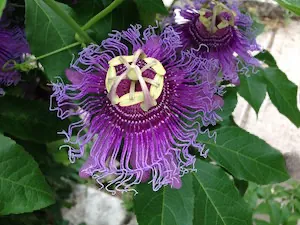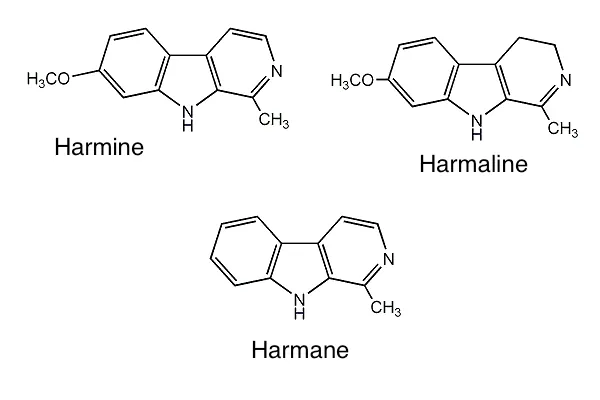Overview of Passionflower
Scientific Name: Passiflora incarnata
Order: Malpighiales
Family: Passifloraceae
Passionflower is native to eastern North America. Another species, passion fruit (Passiflora edulis, is cultivated for its edible purple fruit. The green fruits of passionflower are edible and turn yellowish when overripe. Some consider passionflower and Passiflora edulis the same species; however, one study [Dhawan et al. 2001] considers them two separate species because of difference in the composition of their compounds.
Strong:
insufficient informationGood:
insufficient informationPromising:
insufficient informationConflicting (Unclear):
insufficient informationLimited Evidence:
- Anxiety, like oxazepam, but with fewer side effects; and a combination of passionflower / Crataegus / Ballota / Valeriana / Cola / Paullinia was effective [2-3]
- Anxiety Reducer before Surgery [4-5]
- Calming and Anti-Depressive Properties, passionflower with valerian / St. John’s wort [6]
- Sleep Disorders/Insomnia, a combination of passionflower / valerian / hops was a short-term alternative to zolpidem [7]
- Nervous Agitation in Children, passionflower with valerian / St. John’s wort [8]
- Opiate Withdrawal, passionflower with clonidine was more effective even over clonidine alone [9]
- Sleep Quality, short-term improvement [10]
- Somatoform Disorder, a complex mixture with butterbur [11]
- Asthma in Adults, fruit peel from Passiflora edulis [12]
- Osteoarthritis/Joint Pain, fruit peel from Passiflora edulis [13]
- Type 2 Diabetes, fruit peel from Passiflora edulis [14]
No Evidence:
insufficient informationNo Clinical Research:
All other conditions.- Side effects have not been studied.
- Use caution or contact a licensed healthcare practitioner, since there is not enough research on the use of supplements containing passionflower.
- Liver failure and death due to a kava kava/passionflower combination; though kava kava was believed to be the main culprit.
- The related species, Passiflora edulis (passion fruit), may contain compounds toxic to the liver and pancreas.
- Severe nausea, vomiting, drowsiness, prolonged irregular heartbeat, and rapid heartbeat in one patient.
- Dizziness, confusion, and loss of full control of bodily movements in some patients.
- Fruits of passionflower can potentially alter consciousness.
There is not enough research on the use of supplements containing passionflower during pregnancy and breast-feeding, so consult a licensed healthcare practitioner before use or avoid use.
Passionflower is not a "drug", the best doses have not been thoroughly established. Make sure to follow the specific product instructions and take as directed on the label, or consult a licensed healthcare practitioner before use.
1. Dhawan K, Kumar R, Kumar S, Sharma A. Correct identification of Passiflora incarnata Linn, a promising herbal anxiolytic and sedative. J Med Food. 2001 Autumn;4(3):137-144. 2. Akhondzadeh S, Naghavi HR, Vazirian M, Shayeganpour A, Rashidi H, et al. Passionflower in the treatment of generalized anxiety: a pilot double-blind randomized controlled trial with oxazepam. J Clin Pharm Ther. 2001 Oct;26(5):363-7. 3. Bourin M, Bougerol T, Guitton B, Broutin E. A combination of plant extracts in the treatment of outpatients with adjustment disorder with anxious mood: controlled study versus placebo. Fundam Clin Pharmacol. 1997;11(2):127-32. 4. Aslanargun P, Cuvas O, Dikmen B, Aslan E, Yuksel MU. Passiflora incarnata Linneaus as an anxiolytic before spinal anesthesia. J Anesth. 2012 Feb;26(1):39-44. 5. Movafegh A, Alizadeh R, Hajimohamadi F, Esfehani F, Nejatfar M. Preoperative oral Passiflora incarnata reduces anxiety in ambulatory surgery patients: a double-blind, placebo-controlled study. Anesth Analg. 2008 Jun;106(6):1728-32. 6. Dimpfel W, Koch K, Weiss G. Early effect of NEURAPAS® balance on current source density (CSD) of human EEG. BMC Psychiatry. 2011 Aug 2;11:123. 7. Maroo N, Hazra A, Das T. Efficacy and safety of a polyherbal sedative-hypnotic formulation NSF-3 in primary insomnia in comparison to zolpidem: a randomized controlled trial. Indian J Pharmacol. 2013 Jan-Feb;45(1):34-9. 8. Trompetter I, Krick B, Weiss G. Herbal triplet in treatment of nervous agitation in children. Wien Med Wochenschr. 2013 Feb;163(3-4):52-7. 9. Akhondzadeh S, Kashani L, Mobaseri M, Hosseini SH, Nikzad S, et al. Passionflower in the treatment of opiates withdrawal: a double-blind randomized controlled trial. J Clin Pharm Ther. 2001 Oct;26(5):369-73. 10. Ngan A, Conduit R. A double-blind, placebo-controlled investigation of the effects of Passiflora incarnata (passionflower) herbal tea on subjective sleep quality. Phytother Res. 2011 Aug;25(8):1153-9. 11. Melzer J, Schrader E, Brattström A, Schellenberg R, Saller R. Fixed herbal drug combination with and without butterbur (Ze 185) for the treatment of patients with somatoform disorders: randomized, placebo-controlled pharmaco-clinical trial. Phytother Res. 2009 Sep;23(9):1303-8. 12. Watson RR, Zibadi S, Rafatpanah H, Jabbari F, Ghasemi R, et al. Oral administration of the purple passion fruit peel extract reduces wheeze and cough and improves shortness of breath in adults with asthma. Nutr Res. 2008 Mar;28(3):166-71. 13. Farid R, Rezaieyazdi Z, Mirfeizi Z, Hatef MR, Mirheidari M, et al. Oral intake of purple passion fruit peel extract reduces pain and stiffness and improves physical function in adult patients with knee osteoarthritis. Nutr Res. 2010 Sep;30(9):601-6. 14. de Queiroz Mdo S, Janebro DI, da Cunha MA, Medeiros Jdos S, Sabaa-Srur AU, et al. Effect of the yellow passion fruit peel flour (Passiflora edulis f flavicarpa deg) in insulin sensitivity in type 2 diabetes mellitus patients. Nutr J. 2012 Oct 22;11:89. 15. Fisher AA, Purcell P, Le Couteur DG. Toxicity of Passiflora incarnata L. J Toxicol Clin Toxicol. 2000;38(1):63-6. 16. Gow PJ, Connelly NJ, Hill RL, Crowley P, Angus PW. Fatal fulminant hepatic failure induced by a natural therapy containing kava. Med J Aust. 2003 May 5;178(9):442-3. 17. Rodriguez-Fragoso L, Reyes-Esparza J, Burchiel SW, Herrera-Ruiz D, Torres E. Risks and benefits of commonly used herbal medicines in Mexico. Toxicol Appl Pharmacol. 2008 Feb 15;227(1):125-35. 18. Carrasco MC, Vallejo JR, Pardo-de-Santayana M, Peral D, Martín MA, et al. Interactions of Valeriana officinalis L and Passiflora incarnata L in a patient treated with lorazepam. Phytother Res. 2009 Dec;23(12):1795-6. 19. Fetrow CW, Avila JR. The complete guide to herbal medicines. Spring House, PA, USA: Springhouse Corporation; 2000. 20. Gruenwald J, Brendler T, Jaenicke C, editors. PDR for herbal medicines. 4th ed. Montvale, NJ, USA: Thomson Healthcare; 2007. 21. Afendi FM, Okada T, Yamazaki M, Hirai-Morita A, Nakamura Y, Nakamura K, Ikeda S, Takahashi H, Altaf-Ul-Amin M, Darusman LK, Saito K, Kanaya S. KNApSAcK family databases: integrated metabolite-plant species databases for multifaceted plant research. Plant Cell Physiol. 2012 Feb;53(2):e1.

